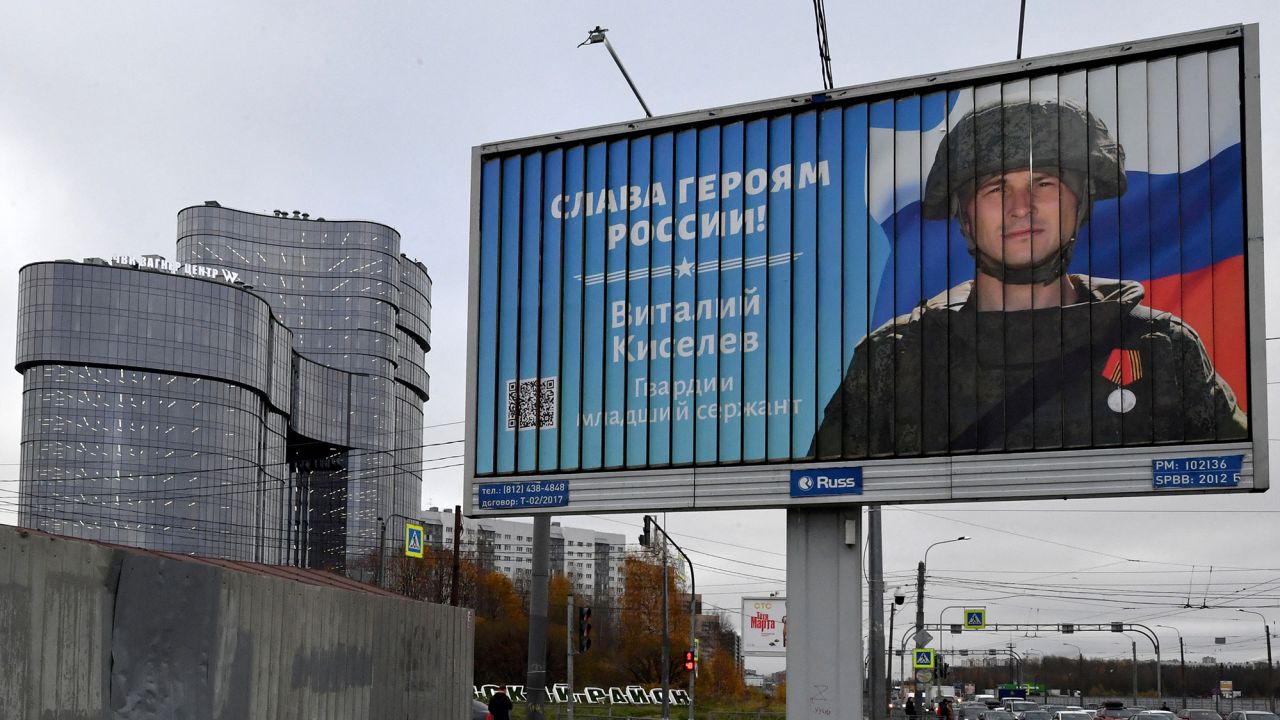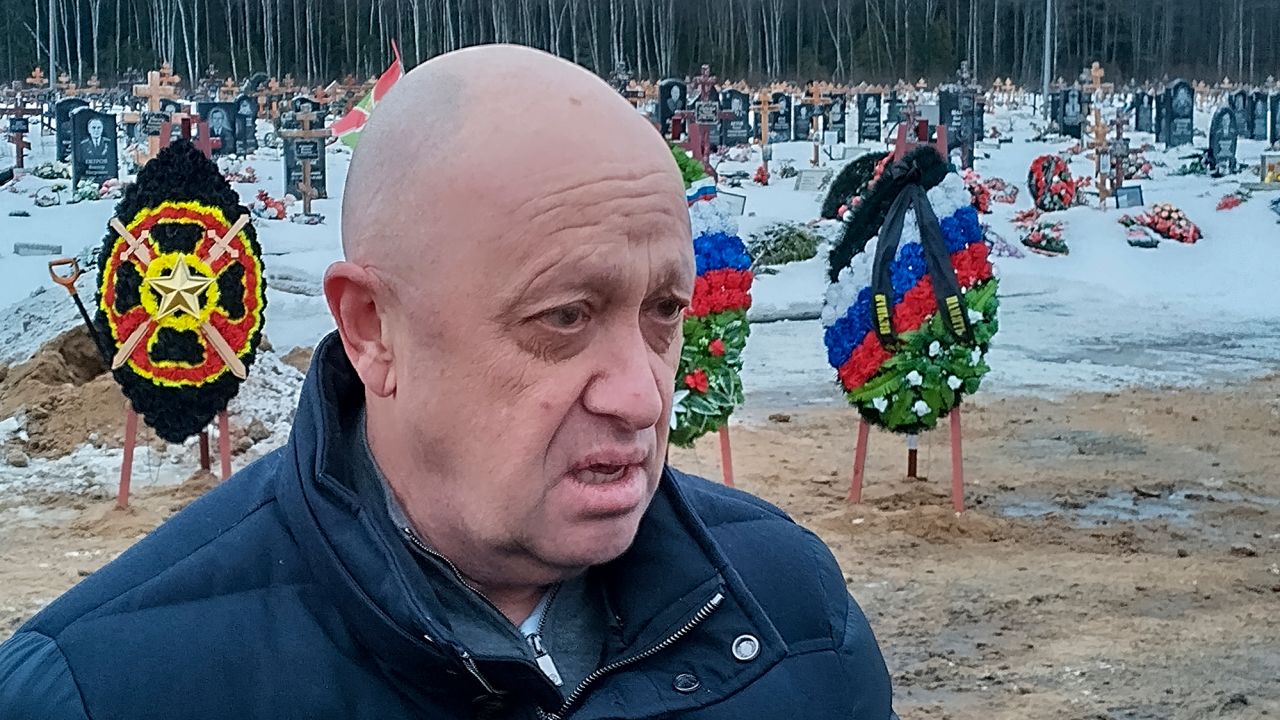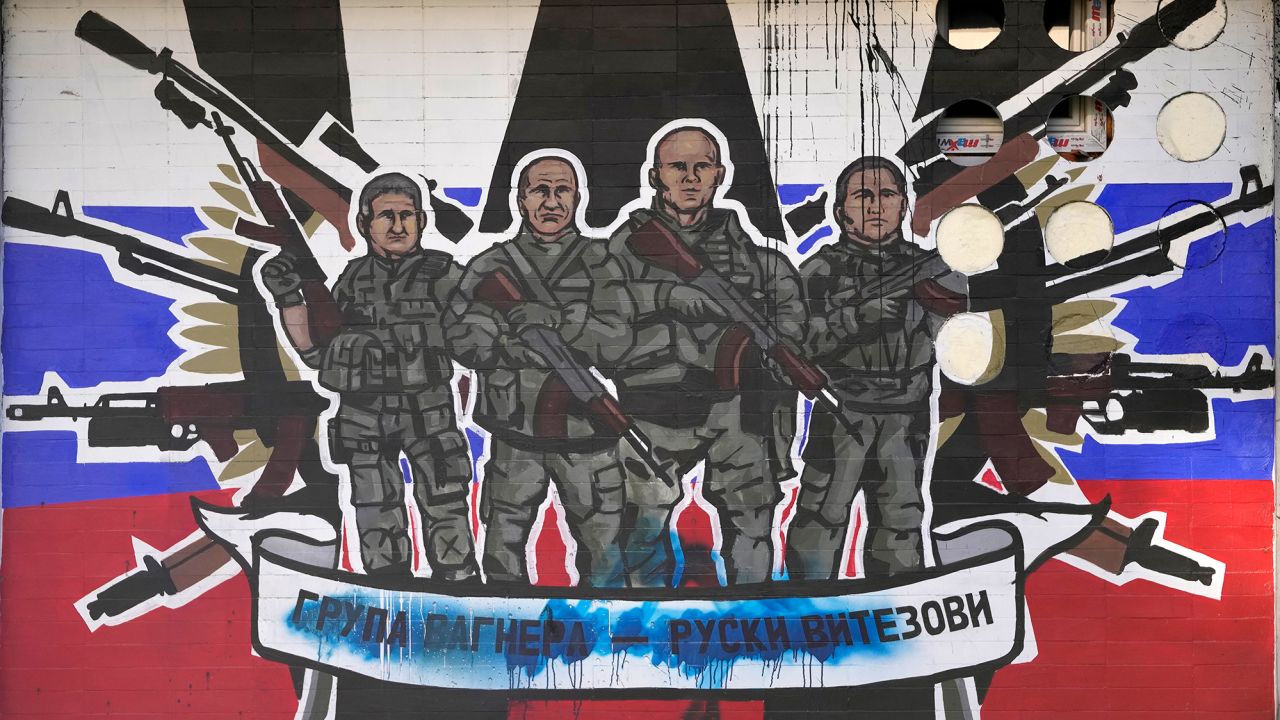Editor’s Note: Warning: This story contains graphic imagery.
CNN
—
It has to count as one of the strangest PR campaigns in memory: using a pile of corpses to make your case to the powers that be.
That’s what Yevgeny Prigozhin, the head of the Russian mercenary group Wagner, appears to have done this week in an unusual public appeal for ammunition for his fighters in Ukraine. And in the process, he has cast a harsh light on his open feud with Russia’s military leadership on the eve of the anniversary of the full-scale invasion of Ukraine.
On Wednesday, Prigozhin posted a picture on Telegram showing the bodies of several dozen slain Wagner fighters, piled unceremoniously in a courtyard. Alongside that shocking photo, he posted the image of a formal request from Wagner for more ammunition, pointing the finger of blame squarely at the Russian Ministry of Defense for squandering one of those lives.
“This is one of the gathering places of the dead,” Prigozhin said. “These are the guys who died yesterday due to the so-called ‘shell starvation’ [by the Russian MOD]. There should have been five times fewer of them. So mothers, wives and children will get their bodies.”
Apparently, the message got through to someone. In a message and voice note Thursday, Prigozhin said a shipment of ammunition was now on its way to his forces.
“Today at 6 am (local) it was reported that shipment of ammunition begins,” he said. “Most likely, the train has started moving … we are told that the main papers have already been signed.”
What was the rationale behind this ghoulish spectacle? Prigozhin already has a reputation for callousness and cruelty: Late last year, around the New Year’s holiday, he visited a morgue stacked with the body bags of dead Wagner soldiers, many of whom had been recruited from prisons with a promise of amnesty.
“Their contracts are over,” he deadpanned. “They’re going home.”
But Prigozhin’s latest stunt appeared to raise the ante in the oligarch’s confrontation with Russia’s defense establishment, and with Defense Minister Sergei Shoigu.
Before Russia’s February 24, 2022 invasion of Ukraine, Prigozhin was a shadowy figure. While the activities of Wagner were well documented – the mercenaries had appeared on battlefields in Syria and Libya as well as on training missions in the Central African Republic – the Russian government more or less denied its existence.
All that changed after Russia’s military suffered humiliating setbacks on the battlefield in Ukraine. Prigozhin – a canny political entrepreneur without any official government position – began openly taking credit for Wagner’s efforts to secure some territorial gains, particularly in the battles raging around the eastern Ukrainian city of Bakhmut.
He even began to acknowledge his role in Russian efforts to interfere with the 2016 US presidential election, admitting that he had founded the Internet Research Agency, the notorious St. Petersburg troll farm that the US government has sanctioned for interfering in American elections.
His unexpected rise prompted speculation about possible elite infighting in Moscow as Russia’s military campaign in Ukraine sputtered. One of Prigozhin’s chief rivals has been Shoigu, who had clashed with the businessman over military contracts given to and then taken from one of the oligarch’s enterprises.
In one recent recording, Prigozhin railed against unnamed “functionaries” – a likely swipe against Shoigu – who “have breakfast, lunch and dinner on golden dishes and send your daughters, granddaughters and whoevers to vacation in Dubai, showing no shame at all, at the very same time that Russian soldiers are dying at the front.”

Russian President Vladimir Putin, who has become a remote and isolated leader since the Covid-19 pandemic, has no clear successor, and some political insiders speculated that some opportunistic upstart – a Prigozhin, for instance – might sense a potential opening or chance to build a power base independent of Putin.
Certainly, Prigozhin’s outbursts would have been unthinkable before February 24, 2022, when open criticism of the defense leadership by a military contractor would not have been tolerated. Earlier this week, Prigozhin escalated his spat with Shoigu and Gen. Valery Gerasimov, the chief of Russia’s General Staff, accusing them of “treason” for their alleged failures to support and supply the Wagner group in Ukraine.
“The Chief of the General Staff and the Minister of Defense are handing out commands right and left, that the Wagner PMC should not receive ammunition, they are also not helping with air transport,” Prigozhin claimed in a recording posted by his press service on Telegram. “This can be equated to high treason now when Wagner PMC are fighting for Bakhmut, losing hundreds of their fighters every day.”
Not everything Prigozhin says can be taken completely at face value. This is the man, after all, who helped bankroll one of Russia’s most notorious disinformation campaigns. And the complaints about ammunition starvation leave unanswered myriad questions about the precise nature of the relationship of Wagner to the Russian military, how its formations are supplied with equipment, and who ultimately exercises command and control over its forces.
In a recent report, Candace Rondeaux, the director of Future Frontlines at the Washington-based New America think tank observed, “Despite perceptions of the Wagner Group as an independent paramilitary organization, Wagner’s branding, communications, and operations are deeply intertwined with the Kremlin, President Vladimir Putin, Putin’s oligarch allies, and the Russian military.”


And one of the unanswered questions remains how, exactly, Prigozhin manages to operate openly, when mercenary activity is technically proscribed by Russian law. The New America report says groups such as Wagner are part of a “cartel-like structure” that intertwines them with the Kremlin, Russia’s power ministries, large state-owned companies, and Putin himself.
“Although Russian citizens are prohibited by law from serving as mercenaries in foreign wars, a small number of Russia’s paramilitaries operate under a set of laws and executive decrees that allows them to provide services on contract to Russian state conglomerates that the Kremlin deems strategic in nature,” Rondeaux wrote. “These include Russia’s state arms conglomerate Rostec as well as energy industry giants Gazprom, Tatneft, Rosneft, and Stroytrangaz.
“All five state-owned firms are headed by Putin’s oldest friends from the days when he was a KGB agent. In effect, this schema allows Putin’s closest inner circle, through frontmen like Prigozhin, to manage the cartel-like structure that constitutes what many think of today as the Wagner Group.”
Whether the Wagner frontman will retain his usefulness to Putin after such crude public criticism, then, remains to be seen. He’s certainly shown little sign of dialing down his media campaign.
On Thursday, Prigozhin posted a video greeting on his Telegram channel to mark the Defender of the Fatherland Day, a Russian national holiday. In the video, Prigozhin is shown a building in the distance that Wagner fighters claim to have taken close to downtown Bakhmut.
Prigozhin gruffly responds: “OK, let’s go, otherwise this will be our last greeting.”
CNN’s Tim Lister, Vasco Cotovio and Radina Gigova contributed to this report.